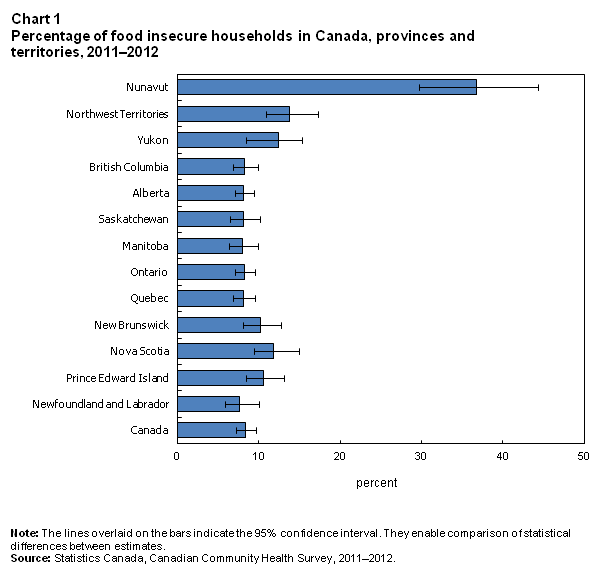
A recent study was released early in the summer, indcating a causation relationship between household food insecurity and increased health care costs in Canada. The data was compiled in a joint effort between the University of Toronto, the University of Illinois, and other qualified parties without endorsements or competing interests. In summation, the study evidenced that total health care costs (including inpatient hospital care, visits to emergency, physician services, same-day surgeries, home care services, and prescription drugs) are significantly higher in households without adequate access to nutritious food.
Statistics Canada defines food insecurity as such;
“Food insecurity exists within a household when one or more members do not have access to the variety or quantity of food that they need due to lack of money.”
To further define food insecurity by household in Canada, the following groups were created;
- Food secure: there is no (or only one) indication of difficulty with access to food because of inadequate income.
- Moderately food insecure: the quality and/or quantity of food consumed is inadequate.
- Severely food insecure: households reduce their food intake and/or experience disrupted eating patterns.
Key Findings of the Study
- Annual health care costs (including costs of prescription drugs) are 23% higher in households with marginal food insecurity
- Annual health care costs are 49% higher in households with moderate food insecurity
- Annual health care costs are 121% higher in households with severe food insecurity
The results of the study are staggering, with exponential increases in health care expenditure for households that cannot afford to consume nutritious foods. A vicious cycle is created as additional household income goes out to cover essential health care costs, reducing the amount available to purchase food for the home. The study also indicated that data compiled from 2012 evidences over 12% of Canada suffers some form of food insecurity. The chart below shows that the territories in particular are at a higher risk for inflated health care costs from food poverty, while also indicating that the issue is still relevant for the entire country as a whole.

The Impact on Canada’s Children
While the study surveyed respondents aged 18-64 and gauged the negative health impacts of food poverty on adults, the relevance to children within Canadian households is quite clear. Our Foundation’s focus is on the youth of Canada, and thus we draw on elements of the study that directly impact our country’s younger dependents. The study noted the following impacts of household food insecurity on children:
- Poorer overall health status at an early age
- Increased development of chronic health conditions (including asthma and depression)
It is also worth noting how the cycle of food insecurity, poor childhood health, and increased household health care costs reverberates into other areas for Canada’s youth:
- Poor attendance in school due to health issues
- Reduced ability to concentrate in school
- Reduced capacity to participate in activities and athletics with peers
Essentially, children impacted by this food poverty / health care cycle may be more likely to underperform in school, attain a lower level of post-secondary level of education, and remain in the same low income status into their adulthood.
What Can Be Done?
The study notes that in Canada, publicly funded programs to eliminate food insecurity simply do not exist. In addition, community-driven food and nutrition programs do not yet have the capacity or resources to impact the country’s level of household food insecurity. It is clear that a “top down” approach at both federal and provincial levels is essential and that policy needs to be changed to intervene and reduce household food insecurity.
We understand that in reading this you may feel somewhat powerless to make a difference. However, there are steps that you can take to help curb the impact of food poverty on health care costs for children in your community.
Community Initiatives to Help Curb Household Food Insecurity
School Breakfast Programs – Ensuring that children receive adequate nutrition begins at the start of the day. While household food poverty may prevent youth from consuming nutritious food at home in the AM, steps can be taken to provide them with a healthy breakfast at school. If there are no existing school breakfast programs in your community, you can help take the necessary steps to start one.
Community Gardens / Urban Farms – Growing a bounty of nutritious organic fruits and vegetables in your community grants urban/suburban children immediate access to the vitamins and minerals (and herbal remedies) that they need to stave off common childhood nutritional deficiencies. To make your community garden/farm truly self-sufficient, to “pay off” for years to come, ensure that you understand the methods of seed preservation. Our Foundation has provided some helpful tips to starting a community farm here and a school garden here.
If everyone in the country contributed in some small way, be it starting a school breakfast program, joining a community garden/farm, or getting involved in a foundation that supports childhood health and nutrition programs we could help put an end to the cycle of food insecurity and inflated health care costs. Learn more about how you can get involved today.








